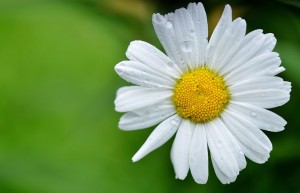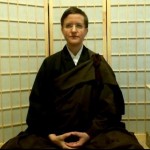 At my Zen center right now we’re studying one of the most treasured Zen texts: Zen master Dogen’s essay “Genjokoan.” This week we’re focusing on this passage:
At my Zen center right now we’re studying one of the most treasured Zen texts: Zen master Dogen’s essay “Genjokoan.” This week we’re focusing on this passage:
“Therefore flowers fall even though we love them; weeds grow even though we dislike them. Conveying oneself toward all things to carry out practice-enlightenment is delusion. All things coming and carrying out practice-enlightenment through the self is realization.” (translation by Shohaku Okumura)
To understand this passage, you first need to consider the two aspects of reality:
Unity (also called the “Absolute”) – Everything in the universe is part of one, seamless reality; this reality when perceived directly is complete, luminous, and precious just as it is; it is not compared to anything and is therefore not lacking anything; it does not depend on anything being any particular way, and therefore is not dependent on our achieving/attaining/finishing anything.
Difference (also called the “Relative”) – The reality of differentiation and manifestation; although each and every being and thing is part of a larger whole and is empty of any inherent, enduring self-nature, each thing also exists in a very real way; there is no life, no Being without the relative, and when Being manifests it’s always in a relative way; there is nothing to be absolute, complete, luminous, and precious without the relative. In the reality of difference there are things to be achieved/attained/finished that help relieve suffering.
Then you need to recognize what Zen practice is about:
Genjokoan, or “Actualizing the simultaneous truths of unity and difference in your life” (my translation) – This is our spiritual practice, and it isn’t easy, but it’s the way to authenticity, effectiveness, and liberation. The Relative is what we’re usually aware of and can’t see beyond. In practice we seek to directly perceive the Absolute as well, by momentarily letting go of all differentiation: self vs other, good vs bad, worldly vs spiritual, sentient vs insentient, etc. Then we have to actualize in our daily lives these two simultaneously true and mutually dependent realities. That is, not just understand them intellectually, but enact and live them.
Okay, so what about flowers falling, and conveying oneself around or not? What is Dogen talking about? I thought it might be helpful to give you a real-life example: mine.
My Story about Oneness with a Flower
“Therefore flowers fall even though we love them; weeds grow even though we dislike them.”
Before any spiritual practice, we’re completely absorbed in the Relative and don’t even question it. There’s me, and there’s a flower, it’s obvious. I have my existence, and each thing or being I encounter has its own existence. We may be related in some way – I may notice and value a flower because it’s beautiful, or I may know the flower’s a weed and think of getting rid of it, or I hardly notice the flower at all. There is me moving through life encountering different things that make my life pleasant or unpleasant, easy or difficult. No matter how I feel about things, inevitably flowers fall and weeds grow. Sometimes life is good, and sometimes it sucks.
Then I experience The Mind That Seeks the Way – I encounter an inspiring spiritual practice and consider the possibility that there’s a different way of living. I hear about Unity, or Absolute Reality. It sounds intriguing, and I’d like to understand more and maybe even experience some of it for myself because it seems like it would really change my outlook on life. So I set out to find that flower again, and this time I’m really going to look at it.
“Conveying oneself toward all things to carry out practice-enlightenment is delusion.”
I sit next to the flower and try to look at it without any sense of separation from it. I try to drop my sense of self, to let go, to allow my mind to settle to the point where there are no thoughts. I sit zazen for many hours at a time in retreat, stay up late at night sitting, try to reach an altered state where the sense of separation will fall away. But no matter how hard I try – no matter what I try – there’s still me staring at the flower, a brutal and undeniable reality of difference.
This is “conveying oneself toward all things to carry out practice enlightenment.” It’s probably a stage we can’t skip. We don’t understand how it’s delusion until we try it and see through it.
Then, still not giving up the practice but pretty much giving up any hope of the special experience of the Absolute I wanted, I find myself worn down, transparent, bored with myself and ready to try something different. Essentially I’ve given up any hope for my self.
“All things coming and carrying out practice-enlightenment through the self is realization.”
I look at flower again. As I do so, I am well trained so I don’t jump into the old narrative assumption of me on my self-interested journey through life, encountering a flower that may or may not seem beautiful to me. However, I also look at the flower with no spiritual agenda. Not trying to see it as empty, not trying to feel one with it, nothing. Just looking, like when we’re just sitting in Shikantaza.
There is the flower and me and the dirt and the breeze and the warmth of the sun and the ant crawling by… and it all – including me and with no special emphasis on me – is one, luminous, precious reality. There isn’t me realizing how it’s all one, luminous, precious reality (at least, not until later) – in the moment of prajna, or enlightenment, we all participate in this reality together. This reality includes unity and difference at the same time, and (a little poetry of my own):
The teachings of the buddhas and ancestors are written in all the atoms and cells,
and each manifestation loudly proclaims the truth by its very existence;
but no comment is necessary. It’s just things as they are.












